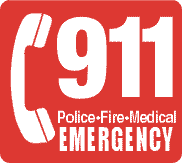 Have you ever had to call 911 but were afraid to do so? Did you know people do not call 911 even when they should?
Have you ever had to call 911 but were afraid to do so? Did you know people do not call 911 even when they should?
I had to call 911 a few months ago due to a small fire in my kitchen. I was uncertain if my small kitchen fire, behind my 35 year old refrigerator with its black smoke quickly moving through the kitchen toward other rooms, warranted a 911 call. I immediately shut off the circuit breakers and then the thoughts came. Will the fire extinguisher work on electrical fires? What if it isn’t electrical? Will I be wasting the time of the fire department? Is this really an emergency? Will I be worrying neighbors for no reason? Its 6:30 in the morning – I’m in my pajamas and my kitchen is a mess – what will they think?
Many people will easily call 911 for someone else – but not for themselves.
So why do we delay in calling or not dial 911 at all?
- We don’t recognize the symptoms of heart attacks and strokes or mistake them for other issues such as heartburn.
- We don’t want to be a bother.
- We don’t want to believe the situation is real.
- We will feel embarrassed if we called 911 and our emergency isn’t a real emergency.
- We thought the symptoms were either not serious or would get better.
- We don’t want emergency vehicles and flashing lights outside of our home.
When should you call 911?
- A car crash, especially if someone is injured
- A fire
- A crime, especially if in progress
- A medical emergency, such as someone is not breathing or gasping for air, unconscious, having chest pain, experiencing an allergic reaction or uncontrolled bleeding
What will happen once you dial 911?
Be prepared to answer the call-taker’s questions – such as:
- The location and nature of the emergency, including the street address
- The phone number you are calling from and don’t hang up, they may need more information.
- Details about the emergency
What else should you know?
- The call-taker is calm and their voice may seem cold and distant – do not take it personally this is their trained demeanor.
- Do not speak right away – wait for the call-taker to ask you the first question. Then speak calmly or at least slowly because you will end up repeating yourself if you are talking fast or talking over the call-taker.
- The smoke from a fire gets into your lungs and you end up coughing up/blowing out black phlegm hours later. A friend reminded me that I took in a lot of smoke at first due the adrenaline rush (breathing fast and heart racing) while I was figuring out what to do.
- The fire department has a fan that can suck out the black smoke from your home quickly – however black soot remains all over items in your home.
- Call 911 – not a friend. Emergency medical services (EMS) staff can begin treatment when they reach you plus you are more likely to be treated faster once you arrive at the hospital by ambulance.
- When calling on a wireless/mobile phone the 911 call-center does not have a fixed location or address (like they do with a land line).
- Provide the call-taker with your wireless phone number, so if the call gets disconnected, they can call you back.
- If you or your child calls 911 accidently do not hang up – explain to the call-taker what happened so they do not think there is an emergency and send responders.
- Talk about calling 911 with those in your household and teach your children how to place an emergency call, in case you are seriously ill or injured.
- Have a plan for removing your animals. I had to grab the cat animal carrier, which I keep handy in case of a tornado but did not plan for a fire.
I am glad that I called 911 that day, even though the fire put itself out, because the cause of the fire was determined and I had peace of mind. Yes it was heart pounding and scary but I learned from the experience. So if you are ever in a situation in which you are uncertain about calling 911 call anyway… officials recommend calling 911 and letting the call-taker determine whether you need emergency help.

